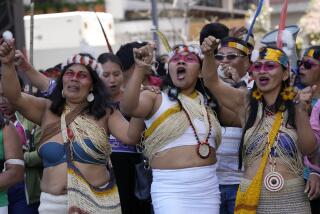Brazil Tries to Rid Yanomami Indian Lands of Gold Prospectors : Amazon: The intruders bring the threat of disease and ravage hunting grounds.
- Share via
BRASILIA, Brazil — Delays in government help for Brazil’s beleaguered Yanomami Indians have permitted thousands of invading gold prospectors to remain on Indian homelands, exposing the Yanomamis to disease and ravaging their traditional hunting grounds.
On Sept. 5, armed prospectors entered a Yanomami village and killed two Indians, including a chieftain known as Lourenco. Indians killed two prospectors in the clash, which reflected the deadly nature of the struggle over Yanomami lands.
Indian rights advocates in Brazil say that since 1987, 1,000 to 2,000 of Brazil’s 9,000 Yanomamis have died from disease or malnutrition as a result of the prospector invasion. Because they are the largest group among the dwindling native peoples of the Brazilian Amazon region, the struggle of the Yanomamis has drawn international attention.
In January, police acting on a court order began removing about 20,000 prospectors from the Yanomami lands, which extend along the Venezuelan border of Roraima state in far northwestern Brazil. But last week, officials in the independent attorney general’s office in Brasilia said that between 2,000 and 3,000 prospectors remain in the area.
Lack of funds, heavy seasonal rains and political maneuvering are some of the reasons given for delays in evicting prospectors.
Government officials now say they are preparing a final push that will remove all unwelcome outsiders from the area of 36,000 square miles. A health program for the Indians is to be carried out at the same time.
Most of about $2 million in funding for the project, called Operation Yanomami, has been tied up for weeks in bureaucratic red tape at the Economics Ministry. The operation is being planned by the National Indian Foundation, a government agency known as Funai.
Cantidio Guerreiro Guimaraes, a retired air force sergeant who was appointed president of the agency in August, said the money will soon be released and that the operation will begin this month.
“We are waiting for the rains to cease for us to (complete) the removal of the prospectors,” Guimaraes said. “They are going to be removed by helicopter and left outside the area.” He said equipment used by prospecting groups, including airplanes and dredges, will be confiscated if found in the Yanomami area.
In an interview, Guimaraes said, “We want to finish the operation, leave the area free (of prospectors), by the 28th of December.”
But he added that it may take 20 years for Yanomami hunting grounds to recover from depredation by the prospectors, who have deforested large areas, polluted rivers with mercury and torn up river beds in their search for gold. Mining activity and environmental damage have severely reduced the availability of vital fish and game.
“Today, those areas are going to be of very little use to the Yanomami Indians, because they are practically destroyed,” Guimaraes said.
Jose Carlos Libanio, executive secretary of a liberal lobbying group called Nucleus for Indian Rights, said President Fernando Collor de Mello, who took office in March, has not taken strong action against the invading prospectors for political reasons.
Prospectors and gold traders are powerful interest groups in Roraima state politics. According to Libanio, Collor wants them to support his allies in Oct. 3 elections for state offices and the national Congress.
However, Bernardo Cabral, Collor’s justice minister, said the president is firmly on the side of the Indians.
“President Collor’s objective is to treat Indian reservations as a kind of sanctuary,” Cabral said. “The Collor government is not going to permit prospectors to continue invading Indian territory, carrying diseases into the Indian territory.”
More to Read
Sign up for Essential California
The most important California stories and recommendations in your inbox every morning.
You may occasionally receive promotional content from the Los Angeles Times.













